Hotel Management Functions and Principles
VerifiedAdded on 2021/02/22
|8
|2381
|64
AI Summary
This assignment delves into the key aspects of hotel management, focusing on the essential functions that direct and control the business. It highlights the importance of recruiting qualified staff, improving communication among departments, and providing training to employees to enhance their skills and knowledge. The management is also expected to provide compensation and benefits, such as rewards and incentives, to motivate and retain staff, leading to loyalty towards the company.
Contribute Materials
Your contribution can guide someone’s learning journey. Share your
documents today.
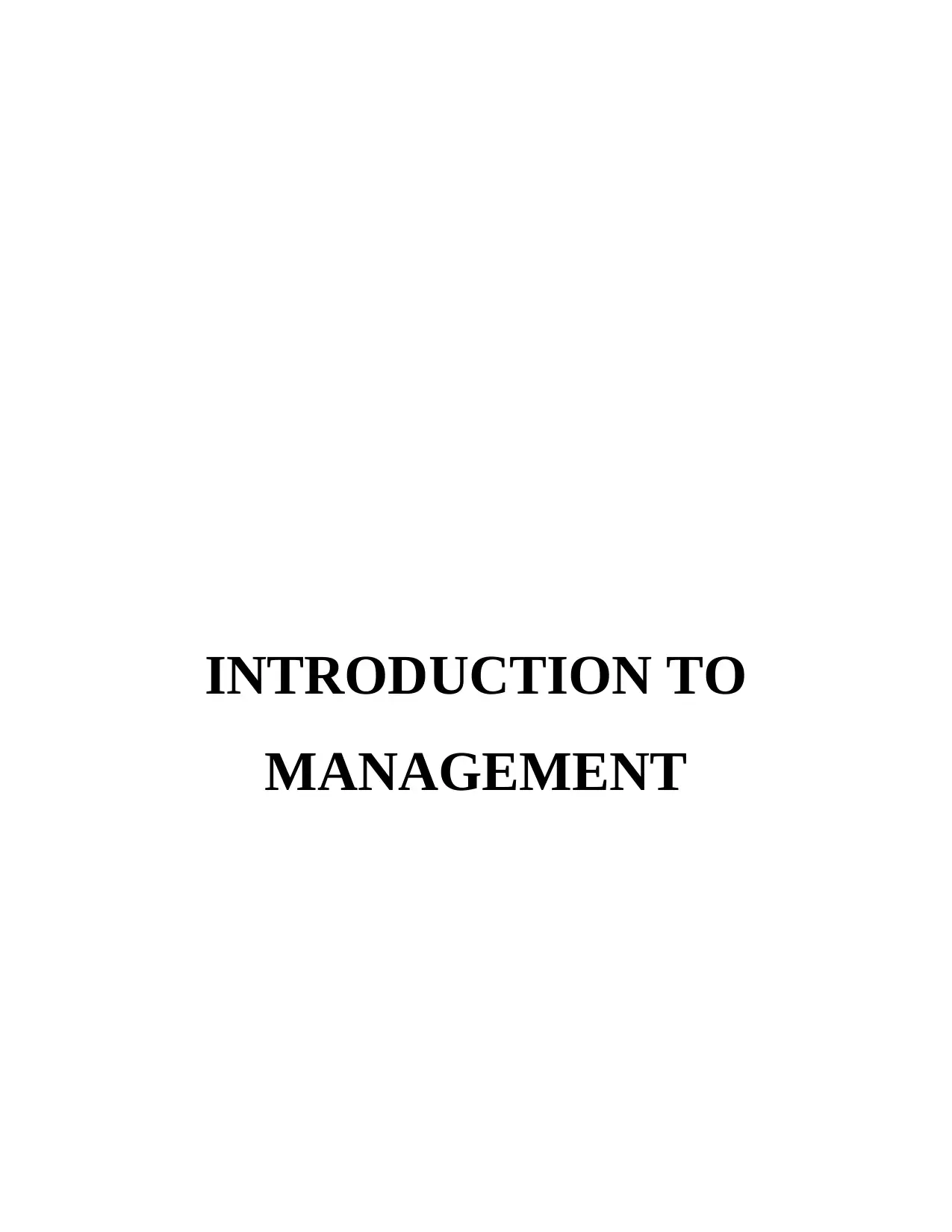
INTRODUCTION TO
MANAGEMENT
MANAGEMENT
Secure Best Marks with AI Grader
Need help grading? Try our AI Grader for instant feedback on your assignments.
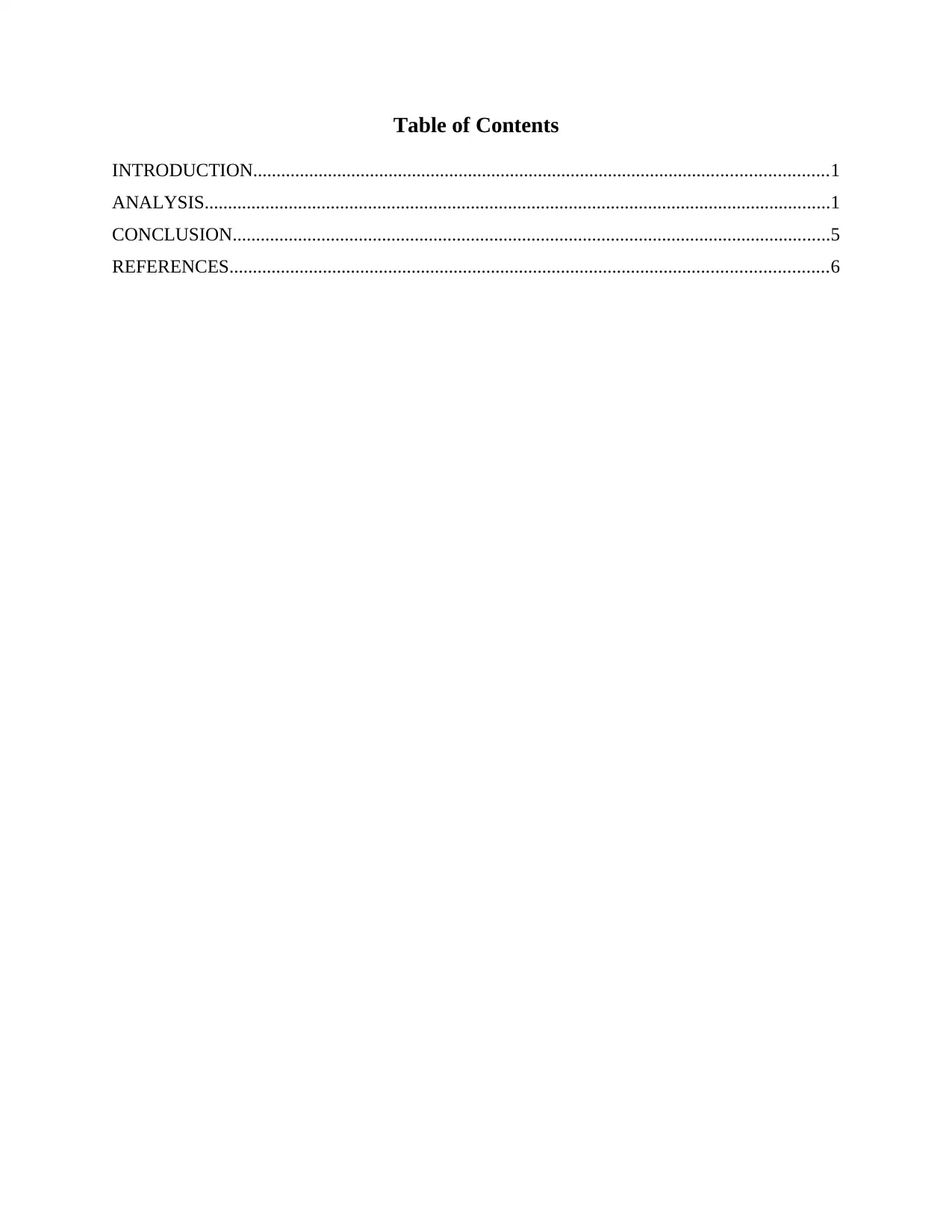
Table of Contents
INTRODUCTION...........................................................................................................................1
ANALYSIS......................................................................................................................................1
CONCLUSION................................................................................................................................5
REFERENCES................................................................................................................................6
INTRODUCTION...........................................................................................................................1
ANALYSIS......................................................................................................................................1
CONCLUSION................................................................................................................................5
REFERENCES................................................................................................................................6
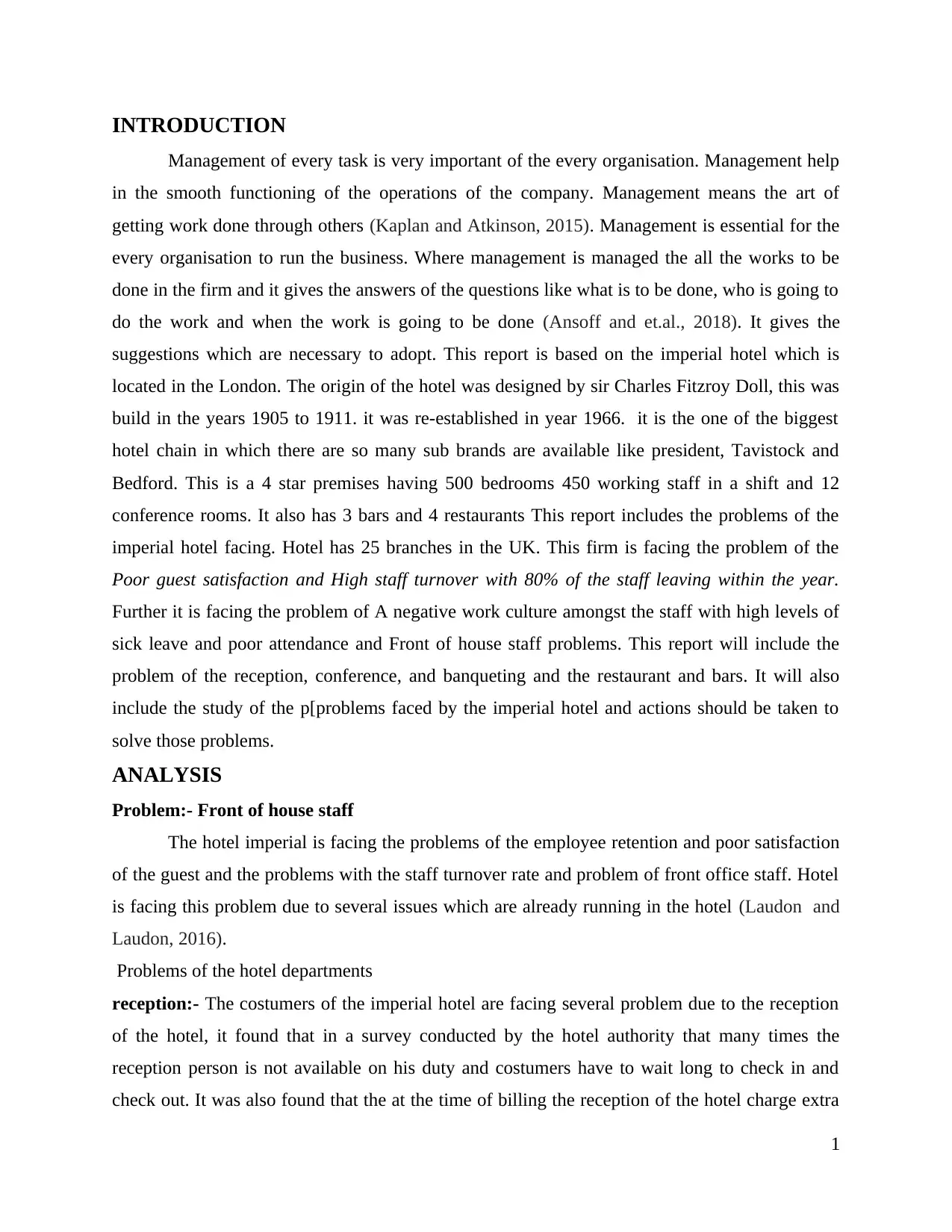
INTRODUCTION
Management of every task is very important of the every organisation. Management help
in the smooth functioning of the operations of the company. Management means the art of
getting work done through others (Kaplan and Atkinson, 2015). Management is essential for the
every organisation to run the business. Where management is managed the all the works to be
done in the firm and it gives the answers of the questions like what is to be done, who is going to
do the work and when the work is going to be done (Ansoff and et.al., 2018). It gives the
suggestions which are necessary to adopt. This report is based on the imperial hotel which is
located in the London. The origin of the hotel was designed by sir Charles Fitzroy Doll, this was
build in the years 1905 to 1911. it was re-established in year 1966. it is the one of the biggest
hotel chain in which there are so many sub brands are available like president, Tavistock and
Bedford. This is a 4 star premises having 500 bedrooms 450 working staff in a shift and 12
conference rooms. It also has 3 bars and 4 restaurants This report includes the problems of the
imperial hotel facing. Hotel has 25 branches in the UK. This firm is facing the problem of the
Poor guest satisfaction and High staff turnover with 80% of the staff leaving within the year.
Further it is facing the problem of A negative work culture amongst the staff with high levels of
sick leave and poor attendance and Front of house staff problems. This report will include the
problem of the reception, conference, and banqueting and the restaurant and bars. It will also
include the study of the p[problems faced by the imperial hotel and actions should be taken to
solve those problems.
ANALYSIS
Problem:- Front of house staff
The hotel imperial is facing the problems of the employee retention and poor satisfaction
of the guest and the problems with the staff turnover rate and problem of front office staff. Hotel
is facing this problem due to several issues which are already running in the hotel (Laudon and
Laudon, 2016).
Problems of the hotel departments
reception:- The costumers of the imperial hotel are facing several problem due to the reception
of the hotel, it found that in a survey conducted by the hotel authority that many times the
reception person is not available on his duty and costumers have to wait long to check in and
check out. It was also found that the at the time of billing the reception of the hotel charge extra
1
Management of every task is very important of the every organisation. Management help
in the smooth functioning of the operations of the company. Management means the art of
getting work done through others (Kaplan and Atkinson, 2015). Management is essential for the
every organisation to run the business. Where management is managed the all the works to be
done in the firm and it gives the answers of the questions like what is to be done, who is going to
do the work and when the work is going to be done (Ansoff and et.al., 2018). It gives the
suggestions which are necessary to adopt. This report is based on the imperial hotel which is
located in the London. The origin of the hotel was designed by sir Charles Fitzroy Doll, this was
build in the years 1905 to 1911. it was re-established in year 1966. it is the one of the biggest
hotel chain in which there are so many sub brands are available like president, Tavistock and
Bedford. This is a 4 star premises having 500 bedrooms 450 working staff in a shift and 12
conference rooms. It also has 3 bars and 4 restaurants This report includes the problems of the
imperial hotel facing. Hotel has 25 branches in the UK. This firm is facing the problem of the
Poor guest satisfaction and High staff turnover with 80% of the staff leaving within the year.
Further it is facing the problem of A negative work culture amongst the staff with high levels of
sick leave and poor attendance and Front of house staff problems. This report will include the
problem of the reception, conference, and banqueting and the restaurant and bars. It will also
include the study of the p[problems faced by the imperial hotel and actions should be taken to
solve those problems.
ANALYSIS
Problem:- Front of house staff
The hotel imperial is facing the problems of the employee retention and poor satisfaction
of the guest and the problems with the staff turnover rate and problem of front office staff. Hotel
is facing this problem due to several issues which are already running in the hotel (Laudon and
Laudon, 2016).
Problems of the hotel departments
reception:- The costumers of the imperial hotel are facing several problem due to the reception
of the hotel, it found that in a survey conducted by the hotel authority that many times the
reception person is not available on his duty and costumers have to wait long to check in and
check out. It was also found that the at the time of billing the reception of the hotel charge extra
1
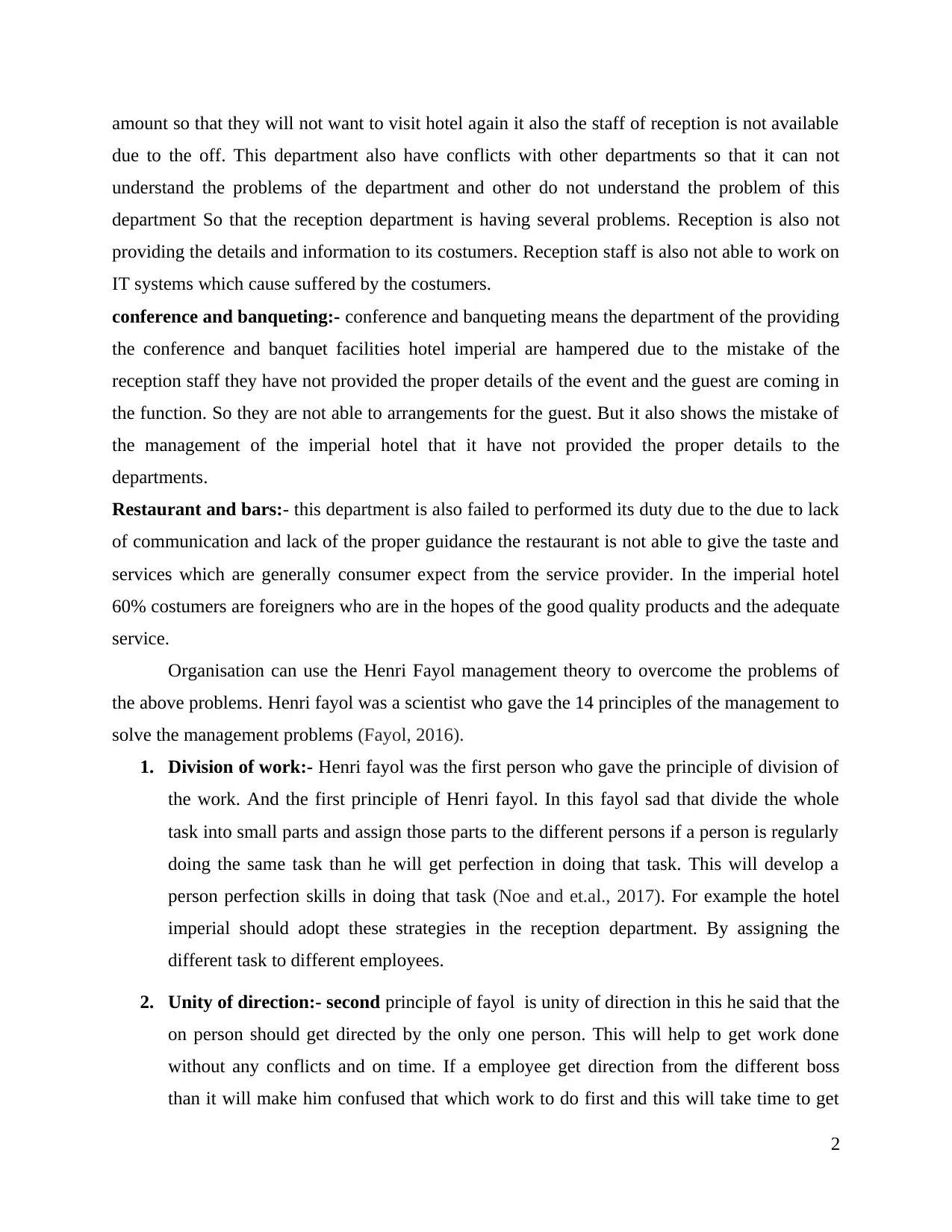
amount so that they will not want to visit hotel again it also the staff of reception is not available
due to the off. This department also have conflicts with other departments so that it can not
understand the problems of the department and other do not understand the problem of this
department So that the reception department is having several problems. Reception is also not
providing the details and information to its costumers. Reception staff is also not able to work on
IT systems which cause suffered by the costumers.
conference and banqueting:- conference and banqueting means the department of the providing
the conference and banquet facilities hotel imperial are hampered due to the mistake of the
reception staff they have not provided the proper details of the event and the guest are coming in
the function. So they are not able to arrangements for the guest. But it also shows the mistake of
the management of the imperial hotel that it have not provided the proper details to the
departments.
Restaurant and bars:- this department is also failed to performed its duty due to the due to lack
of communication and lack of the proper guidance the restaurant is not able to give the taste and
services which are generally consumer expect from the service provider. In the imperial hotel
60% costumers are foreigners who are in the hopes of the good quality products and the adequate
service.
Organisation can use the Henri Fayol management theory to overcome the problems of
the above problems. Henri fayol was a scientist who gave the 14 principles of the management to
solve the management problems (Fayol, 2016).
1. Division of work:- Henri fayol was the first person who gave the principle of division of
the work. And the first principle of Henri fayol. In this fayol sad that divide the whole
task into small parts and assign those parts to the different persons if a person is regularly
doing the same task than he will get perfection in doing that task. This will develop a
person perfection skills in doing that task (Noe and et.al., 2017). For example the hotel
imperial should adopt these strategies in the reception department. By assigning the
different task to different employees.
2. Unity of direction:- second principle of fayol is unity of direction in this he said that the
on person should get directed by the only one person. This will help to get work done
without any conflicts and on time. If a employee get direction from the different boss
than it will make him confused that which work to do first and this will take time to get
2
due to the off. This department also have conflicts with other departments so that it can not
understand the problems of the department and other do not understand the problem of this
department So that the reception department is having several problems. Reception is also not
providing the details and information to its costumers. Reception staff is also not able to work on
IT systems which cause suffered by the costumers.
conference and banqueting:- conference and banqueting means the department of the providing
the conference and banquet facilities hotel imperial are hampered due to the mistake of the
reception staff they have not provided the proper details of the event and the guest are coming in
the function. So they are not able to arrangements for the guest. But it also shows the mistake of
the management of the imperial hotel that it have not provided the proper details to the
departments.
Restaurant and bars:- this department is also failed to performed its duty due to the due to lack
of communication and lack of the proper guidance the restaurant is not able to give the taste and
services which are generally consumer expect from the service provider. In the imperial hotel
60% costumers are foreigners who are in the hopes of the good quality products and the adequate
service.
Organisation can use the Henri Fayol management theory to overcome the problems of
the above problems. Henri fayol was a scientist who gave the 14 principles of the management to
solve the management problems (Fayol, 2016).
1. Division of work:- Henri fayol was the first person who gave the principle of division of
the work. And the first principle of Henri fayol. In this fayol sad that divide the whole
task into small parts and assign those parts to the different persons if a person is regularly
doing the same task than he will get perfection in doing that task. This will develop a
person perfection skills in doing that task (Noe and et.al., 2017). For example the hotel
imperial should adopt these strategies in the reception department. By assigning the
different task to different employees.
2. Unity of direction:- second principle of fayol is unity of direction in this he said that the
on person should get directed by the only one person. This will help to get work done
without any conflicts and on time. If a employee get direction from the different boss
than it will make him confused that which work to do first and this will take time to get
2
Secure Best Marks with AI Grader
Need help grading? Try our AI Grader for instant feedback on your assignments.
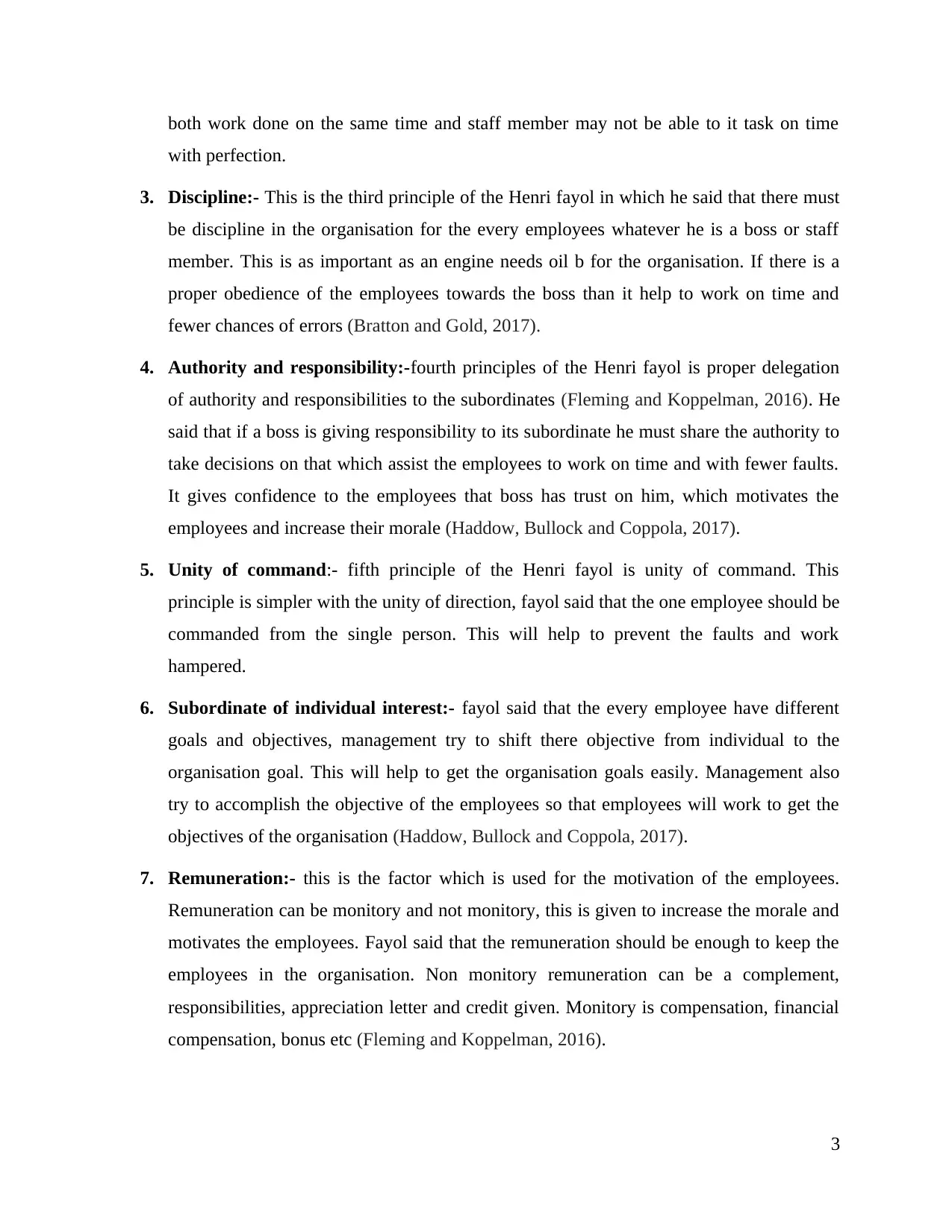
both work done on the same time and staff member may not be able to it task on time
with perfection.
3. Discipline:- This is the third principle of the Henri fayol in which he said that there must
be discipline in the organisation for the every employees whatever he is a boss or staff
member. This is as important as an engine needs oil b for the organisation. If there is a
proper obedience of the employees towards the boss than it help to work on time and
fewer chances of errors (Bratton and Gold, 2017).
4. Authority and responsibility:-fourth principles of the Henri fayol is proper delegation
of authority and responsibilities to the subordinates (Fleming and Koppelman, 2016). He
said that if a boss is giving responsibility to its subordinate he must share the authority to
take decisions on that which assist the employees to work on time and with fewer faults.
It gives confidence to the employees that boss has trust on him, which motivates the
employees and increase their morale (Haddow, Bullock and Coppola, 2017).
5. Unity of command:- fifth principle of the Henri fayol is unity of command. This
principle is simpler with the unity of direction, fayol said that the one employee should be
commanded from the single person. This will help to prevent the faults and work
hampered.
6. Subordinate of individual interest:- fayol said that the every employee have different
goals and objectives, management try to shift there objective from individual to the
organisation goal. This will help to get the organisation goals easily. Management also
try to accomplish the objective of the employees so that employees will work to get the
objectives of the organisation (Haddow, Bullock and Coppola, 2017).
7. Remuneration:- this is the factor which is used for the motivation of the employees.
Remuneration can be monitory and not monitory, this is given to increase the morale and
motivates the employees. Fayol said that the remuneration should be enough to keep the
employees in the organisation. Non monitory remuneration can be a complement,
responsibilities, appreciation letter and credit given. Monitory is compensation, financial
compensation, bonus etc (Fleming and Koppelman, 2016).
3
with perfection.
3. Discipline:- This is the third principle of the Henri fayol in which he said that there must
be discipline in the organisation for the every employees whatever he is a boss or staff
member. This is as important as an engine needs oil b for the organisation. If there is a
proper obedience of the employees towards the boss than it help to work on time and
fewer chances of errors (Bratton and Gold, 2017).
4. Authority and responsibility:-fourth principles of the Henri fayol is proper delegation
of authority and responsibilities to the subordinates (Fleming and Koppelman, 2016). He
said that if a boss is giving responsibility to its subordinate he must share the authority to
take decisions on that which assist the employees to work on time and with fewer faults.
It gives confidence to the employees that boss has trust on him, which motivates the
employees and increase their morale (Haddow, Bullock and Coppola, 2017).
5. Unity of command:- fifth principle of the Henri fayol is unity of command. This
principle is simpler with the unity of direction, fayol said that the one employee should be
commanded from the single person. This will help to prevent the faults and work
hampered.
6. Subordinate of individual interest:- fayol said that the every employee have different
goals and objectives, management try to shift there objective from individual to the
organisation goal. This will help to get the organisation goals easily. Management also
try to accomplish the objective of the employees so that employees will work to get the
objectives of the organisation (Haddow, Bullock and Coppola, 2017).
7. Remuneration:- this is the factor which is used for the motivation of the employees.
Remuneration can be monitory and not monitory, this is given to increase the morale and
motivates the employees. Fayol said that the remuneration should be enough to keep the
employees in the organisation. Non monitory remuneration can be a complement,
responsibilities, appreciation letter and credit given. Monitory is compensation, financial
compensation, bonus etc (Fleming and Koppelman, 2016).
3
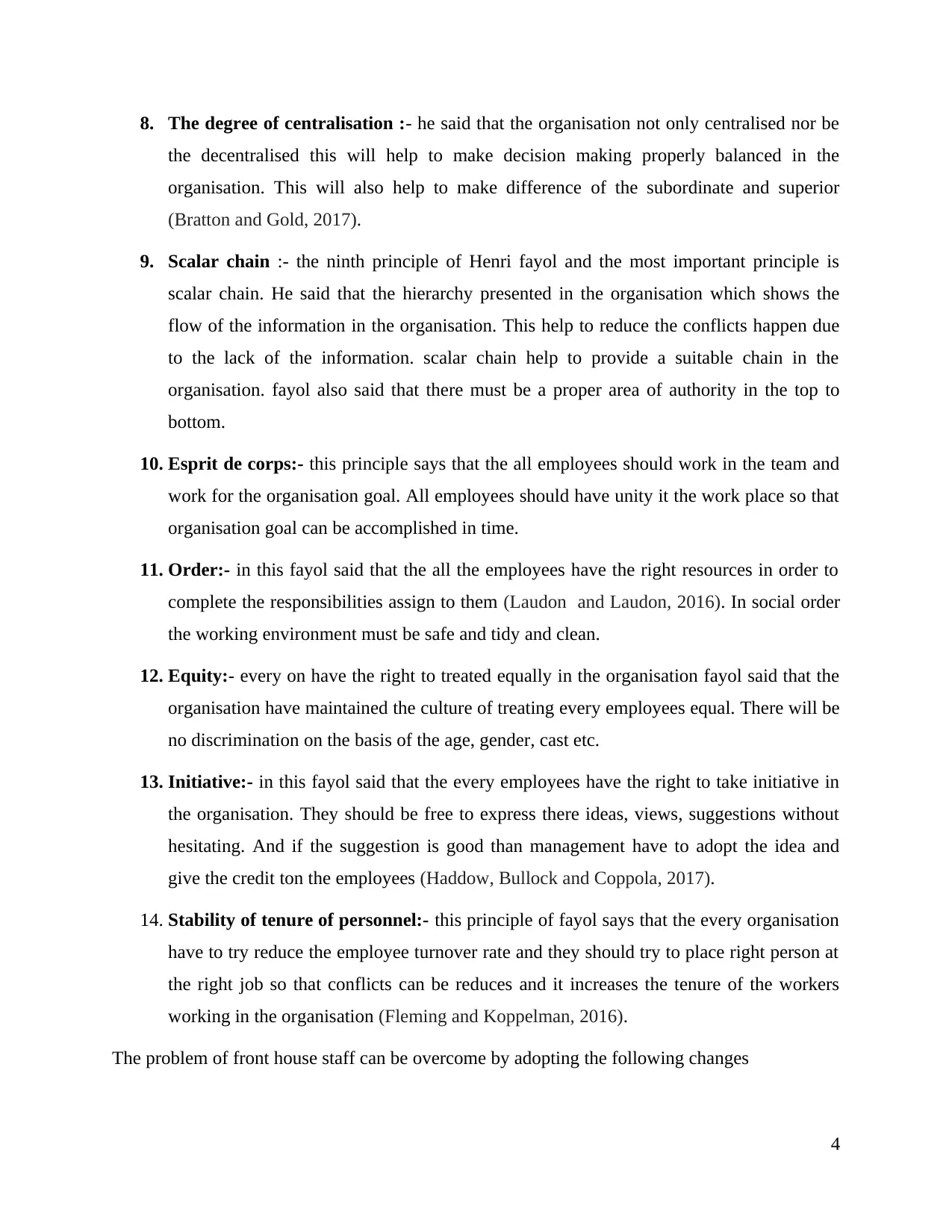
8. The degree of centralisation :- he said that the organisation not only centralised nor be
the decentralised this will help to make decision making properly balanced in the
organisation. This will also help to make difference of the subordinate and superior
(Bratton and Gold, 2017).
9. Scalar chain :- the ninth principle of Henri fayol and the most important principle is
scalar chain. He said that the hierarchy presented in the organisation which shows the
flow of the information in the organisation. This help to reduce the conflicts happen due
to the lack of the information. scalar chain help to provide a suitable chain in the
organisation. fayol also said that there must be a proper area of authority in the top to
bottom.
10. Esprit de corps:- this principle says that the all employees should work in the team and
work for the organisation goal. All employees should have unity it the work place so that
organisation goal can be accomplished in time.
11. Order:- in this fayol said that the all the employees have the right resources in order to
complete the responsibilities assign to them (Laudon and Laudon, 2016). In social order
the working environment must be safe and tidy and clean.
12. Equity:- every on have the right to treated equally in the organisation fayol said that the
organisation have maintained the culture of treating every employees equal. There will be
no discrimination on the basis of the age, gender, cast etc.
13. Initiative:- in this fayol said that the every employees have the right to take initiative in
the organisation. They should be free to express there ideas, views, suggestions without
hesitating. And if the suggestion is good than management have to adopt the idea and
give the credit ton the employees (Haddow, Bullock and Coppola, 2017).
14. Stability of tenure of personnel:- this principle of fayol says that the every organisation
have to try reduce the employee turnover rate and they should try to place right person at
the right job so that conflicts can be reduces and it increases the tenure of the workers
working in the organisation (Fleming and Koppelman, 2016).
The problem of front house staff can be overcome by adopting the following changes
4
the decentralised this will help to make decision making properly balanced in the
organisation. This will also help to make difference of the subordinate and superior
(Bratton and Gold, 2017).
9. Scalar chain :- the ninth principle of Henri fayol and the most important principle is
scalar chain. He said that the hierarchy presented in the organisation which shows the
flow of the information in the organisation. This help to reduce the conflicts happen due
to the lack of the information. scalar chain help to provide a suitable chain in the
organisation. fayol also said that there must be a proper area of authority in the top to
bottom.
10. Esprit de corps:- this principle says that the all employees should work in the team and
work for the organisation goal. All employees should have unity it the work place so that
organisation goal can be accomplished in time.
11. Order:- in this fayol said that the all the employees have the right resources in order to
complete the responsibilities assign to them (Laudon and Laudon, 2016). In social order
the working environment must be safe and tidy and clean.
12. Equity:- every on have the right to treated equally in the organisation fayol said that the
organisation have maintained the culture of treating every employees equal. There will be
no discrimination on the basis of the age, gender, cast etc.
13. Initiative:- in this fayol said that the every employees have the right to take initiative in
the organisation. They should be free to express there ideas, views, suggestions without
hesitating. And if the suggestion is good than management have to adopt the idea and
give the credit ton the employees (Haddow, Bullock and Coppola, 2017).
14. Stability of tenure of personnel:- this principle of fayol says that the every organisation
have to try reduce the employee turnover rate and they should try to place right person at
the right job so that conflicts can be reduces and it increases the tenure of the workers
working in the organisation (Fleming and Koppelman, 2016).
The problem of front house staff can be overcome by adopting the following changes
4
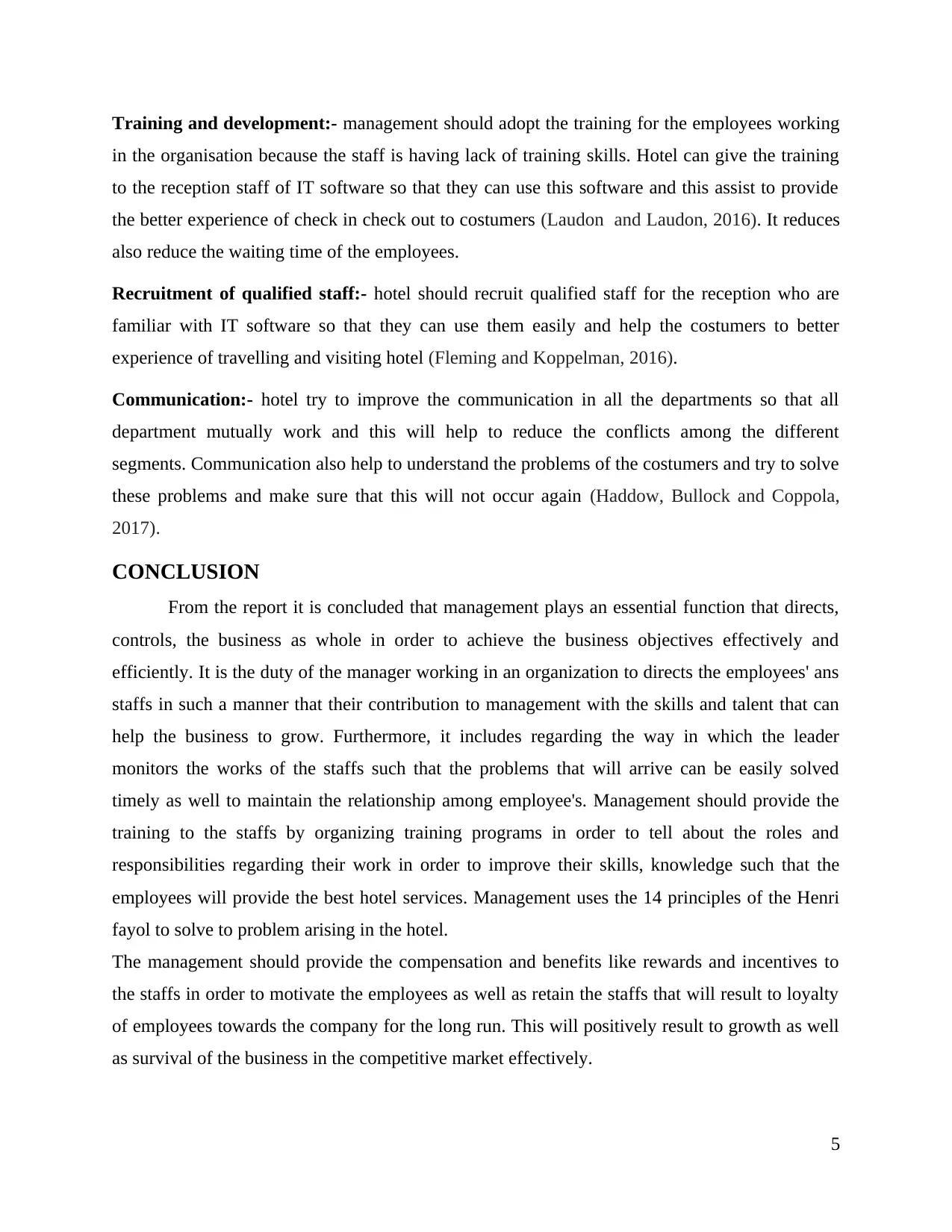
Training and development:- management should adopt the training for the employees working
in the organisation because the staff is having lack of training skills. Hotel can give the training
to the reception staff of IT software so that they can use this software and this assist to provide
the better experience of check in check out to costumers (Laudon and Laudon, 2016). It reduces
also reduce the waiting time of the employees.
Recruitment of qualified staff:- hotel should recruit qualified staff for the reception who are
familiar with IT software so that they can use them easily and help the costumers to better
experience of travelling and visiting hotel (Fleming and Koppelman, 2016).
Communication:- hotel try to improve the communication in all the departments so that all
department mutually work and this will help to reduce the conflicts among the different
segments. Communication also help to understand the problems of the costumers and try to solve
these problems and make sure that this will not occur again (Haddow, Bullock and Coppola,
2017).
CONCLUSION
From the report it is concluded that management plays an essential function that directs,
controls, the business as whole in order to achieve the business objectives effectively and
efficiently. It is the duty of the manager working in an organization to directs the employees' ans
staffs in such a manner that their contribution to management with the skills and talent that can
help the business to grow. Furthermore, it includes regarding the way in which the leader
monitors the works of the staffs such that the problems that will arrive can be easily solved
timely as well to maintain the relationship among employee's. Management should provide the
training to the staffs by organizing training programs in order to tell about the roles and
responsibilities regarding their work in order to improve their skills, knowledge such that the
employees will provide the best hotel services. Management uses the 14 principles of the Henri
fayol to solve to problem arising in the hotel.
The management should provide the compensation and benefits like rewards and incentives to
the staffs in order to motivate the employees as well as retain the staffs that will result to loyalty
of employees towards the company for the long run. This will positively result to growth as well
as survival of the business in the competitive market effectively.
5
in the organisation because the staff is having lack of training skills. Hotel can give the training
to the reception staff of IT software so that they can use this software and this assist to provide
the better experience of check in check out to costumers (Laudon and Laudon, 2016). It reduces
also reduce the waiting time of the employees.
Recruitment of qualified staff:- hotel should recruit qualified staff for the reception who are
familiar with IT software so that they can use them easily and help the costumers to better
experience of travelling and visiting hotel (Fleming and Koppelman, 2016).
Communication:- hotel try to improve the communication in all the departments so that all
department mutually work and this will help to reduce the conflicts among the different
segments. Communication also help to understand the problems of the costumers and try to solve
these problems and make sure that this will not occur again (Haddow, Bullock and Coppola,
2017).
CONCLUSION
From the report it is concluded that management plays an essential function that directs,
controls, the business as whole in order to achieve the business objectives effectively and
efficiently. It is the duty of the manager working in an organization to directs the employees' ans
staffs in such a manner that their contribution to management with the skills and talent that can
help the business to grow. Furthermore, it includes regarding the way in which the leader
monitors the works of the staffs such that the problems that will arrive can be easily solved
timely as well to maintain the relationship among employee's. Management should provide the
training to the staffs by organizing training programs in order to tell about the roles and
responsibilities regarding their work in order to improve their skills, knowledge such that the
employees will provide the best hotel services. Management uses the 14 principles of the Henri
fayol to solve to problem arising in the hotel.
The management should provide the compensation and benefits like rewards and incentives to
the staffs in order to motivate the employees as well as retain the staffs that will result to loyalty
of employees towards the company for the long run. This will positively result to growth as well
as survival of the business in the competitive market effectively.
5
Paraphrase This Document
Need a fresh take? Get an instant paraphrase of this document with our AI Paraphraser
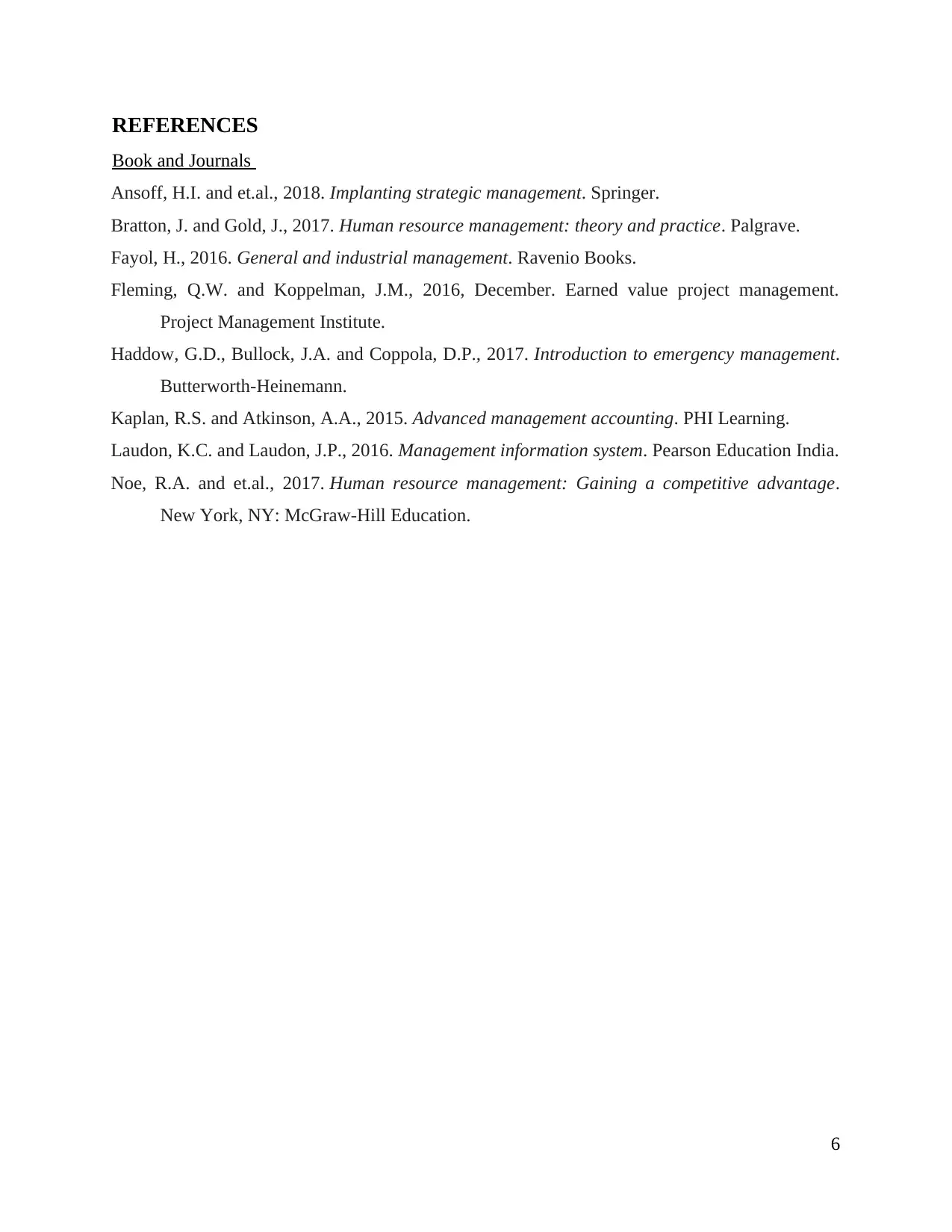
REFERENCES
Book and Journals
Ansoff, H.I. and et.al., 2018. Implanting strategic management. Springer.
Bratton, J. and Gold, J., 2017. Human resource management: theory and practice. Palgrave.
Fayol, H., 2016. General and industrial management. Ravenio Books.
Fleming, Q.W. and Koppelman, J.M., 2016, December. Earned value project management.
Project Management Institute.
Haddow, G.D., Bullock, J.A. and Coppola, D.P., 2017. Introduction to emergency management.
Butterworth-Heinemann.
Kaplan, R.S. and Atkinson, A.A., 2015. Advanced management accounting. PHI Learning.
Laudon, K.C. and Laudon, J.P., 2016. Management information system. Pearson Education India.
Noe, R.A. and et.al., 2017. Human resource management: Gaining a competitive advantage.
New York, NY: McGraw-Hill Education.
6
Book and Journals
Ansoff, H.I. and et.al., 2018. Implanting strategic management. Springer.
Bratton, J. and Gold, J., 2017. Human resource management: theory and practice. Palgrave.
Fayol, H., 2016. General and industrial management. Ravenio Books.
Fleming, Q.W. and Koppelman, J.M., 2016, December. Earned value project management.
Project Management Institute.
Haddow, G.D., Bullock, J.A. and Coppola, D.P., 2017. Introduction to emergency management.
Butterworth-Heinemann.
Kaplan, R.S. and Atkinson, A.A., 2015. Advanced management accounting. PHI Learning.
Laudon, K.C. and Laudon, J.P., 2016. Management information system. Pearson Education India.
Noe, R.A. and et.al., 2017. Human resource management: Gaining a competitive advantage.
New York, NY: McGraw-Hill Education.
6
1 out of 8
Related Documents
Your All-in-One AI-Powered Toolkit for Academic Success.
+13062052269
info@desklib.com
Available 24*7 on WhatsApp / Email
![[object Object]](/_next/static/media/star-bottom.7253800d.svg)
Unlock your academic potential
© 2024 | Zucol Services PVT LTD | All rights reserved.





